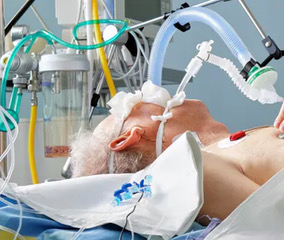Two years into the novel coronavirus pandemic and the end seems further away than ever. At the same time it is clearer than ever that the capitalist economic system is hampering our ability both to live with the virus and to mitigate its worst effects.
Decades of government policy have been designed with a view to promoting and subsidising private health and the purchase of private health insurance by citizens. Income tax relief for the purchase of private insurance accounted for approximately €½ billion per year before the pandemic.¹ Under-resourcing the public health system creates an incentive for people to aspire towards private health, thereby ensuring that private profits can be wrung from what should be a public service.
The ignorance of this particular policy decision has been clearly exposed by the pandemic, with panicked Government decisions to restrict people’s movements and close down sectors of the economy etc., designed in large part to avoid overburdening a creaking public system.
The tension that exists between public freedoms and levels of virus transmission, and therefore the number of individuals in hospital and intensive-care beds, is well established at this point. It is this tension that has driven Government decisions to “lock down” society to some degree or other on multiple occasions since the beginning of 2020.
Ireland boasts one of the highest levels of vaccination in the world, but it also has an extremely low level of ICU capacity, at 5 beds per 100,000 population—less than half the OECD average of 12.²
The Government’s strategy of deflecting attention away from this obvious and embarrassing fact has been to solely blame unvaccinated people for the struggles of the health system, with compliant media more than happy to oblige in promoting this hysteria. Aside from the fact that anger and recrimination, the typical poses adopted when speaking about those who are hesitant, for whatever reason, to be vaccinated, are not typically persuasive when trying to have people come round to your thinking, it should be noted that Ireland’s high level of vaccination (95 per cent of adults³) is probably higher than the Government could possibly have imagined at the start of the programme (Britain is closer to 75 per cent⁴); and yet we are still in dire straits.
While the solution is clear—public-hospital and ICU capacity must be drastically increased—it is equally clear that there is more than one way of achieving this goal. An immediate means of increasing acute capacity would be to take private hospital capacity into public ownership. In a Special Committee debate in June 2020 the total public-hospital capacity was stated as 12,000 to 13,000 beds and the private capacity as 2,000 beds.⁵ The seizure of private bed capacity could mean generating approximately 2,000 new beds in the public system overnight.
By way of context, the highest one-day total for people in hospital with the virus in the 26 Counties was 683, in November 2021.⁶ If the period we are now living through does not seem to be enough of an “emergency” to justify the introduction of such a radical measure, consider that the Government has locked down large parts of society multiple times in the past two years because of lack of capacity in the public system, with huge effects on people’s day-to-day lives, not limited to employment, security, and mental health. If not now, then when?
With public good will and enthusiasm diminished since the beginning of the pandemic, and lockdowns still apparently a part of everyday life, despite high vaccination levels, it is clear that we cannot go on like this indefinitely. Covid-19 is now endemic in society, and we must learn to live with it, and minimise its impact on normal life as best we can. To do so we must demand the following:
- a free, universal all-Ireland health service, paid for by the state and accessible to all;
- a great increase in hospital and ICU capacity, by major capital investment in the medium to long term and by the seizure of private hospital capacity for the public good in the short term;
- the launch of a large-scale recruitment campaign in the public health system, including universal improvements to pay and conditions for new and existing workers;
- the immediate introduction of sickness pay legislation, to ensure that workers can stay at home when they are ill and not risk financial penalty or dismissal; and
- the removal of all copyright and patent laws on vaccines, so that generic versions can be produced and distributed globally through public systems.
The public health system in Ireland is dysfunctional and under-resourced. As a result it is not able to cope with the inevitable pressures of an endemic respiratory illness such as covid-19, nor was it able to cope with the demand on its services before the pandemic struck. Waiting-lists for procedures now total roughly one million people,⁷ with 97,000 of those children.⁸
We need to drastically overhaul, expand and rethink the system, by any and all means necessary. The two-tier system cannot continue: the health and safety of an entire people depends on it. One thing is certain: we cannot go on like this.
- Julien Mercille, “Privatization in the Irish hospital sector since 1980,” Journal of Public Health, vol. 40, issue 4 (December 2018), p. 863–870 (tinyurl.com/4j986vs5).
- OECD, “Intensive care beds capacity,” 20 April 2020 (tinyurl.com/3ke4s6y3).
- COVID-19 Ireland, “Vaccinations” (tinyurl.com/2z6tkv9h).
- Our World in Data, “Coronavirus (COVID-19) Vaccinations” (tinyurl.com/v7892e3k).
- Tithe an Oireachtais, “Special Committee on Covid-19 Response” (debate), 2 June 2020 (tinyurl.com/mubud979).
- Maeve Lee and Michelle McGlynn, “One in four people who required critical care for Covid have died,” Irish Examiner, 22 November 2021 (tinyurl.com/2p8srauj).
- Conor Pope, “More than 900,000 people on hospital waiting lists,” Irish Times, 10 September 2021 (tinyurl.com/2d5tdxnb).
- Martha Brennan, “More than 97,000 children on hospital waiting lists ‘not good enough’,” Echo Live, 21 December 2021 (tinyurl.com/2p95cn7a).






